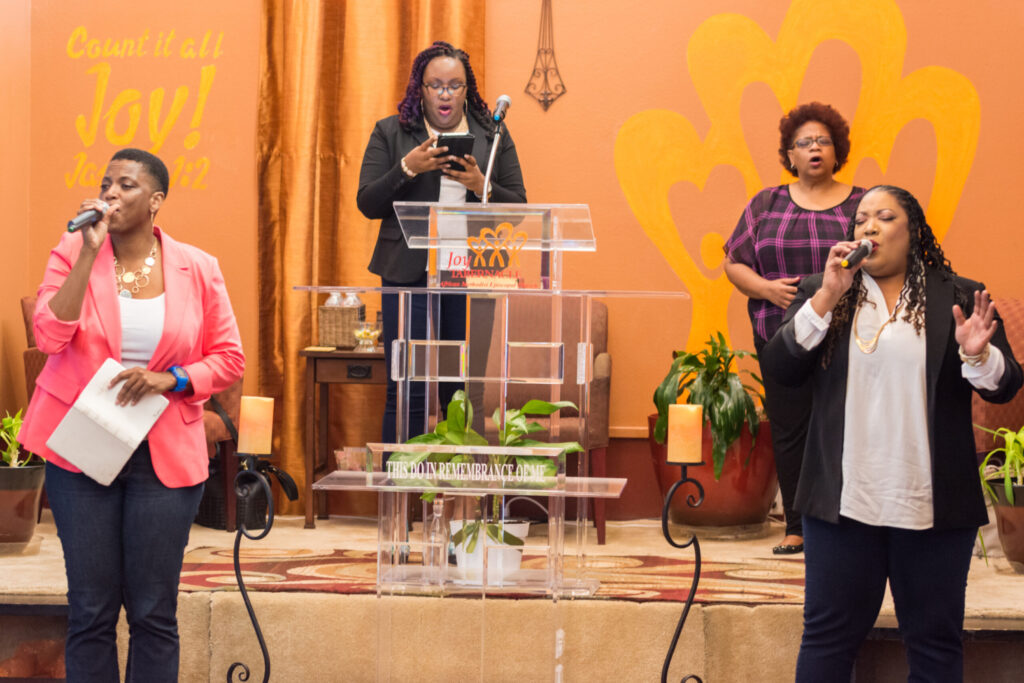Blogger Shannan Baker is a postdoctoral fellow in music and digital humanities at Baylor University, where she recently finished her Ph.D. in Church Music (2022). She is a member of The Center for Congregational Song’s blog team.
How Little We Know
 I recently became aware of how little we know of what the church sings though recent work with the Worship Leader Research (WLR) team. WLR is a collaborative group that studies the contemporary worship music industry and church practice. Some of the feedback to our findings largely focused on what was missing. We identified the primary contributors of contemporary worship songs by looking at the Top lists from CCLI and PraiseCharts, but there were artists that are widely used that were not found on both lists. Many churches that sing songs from other artists, such as Sovereign Grace, City Alight, the Gettys, etc., noted that our research didn’t include songs from those artists. People commented on social media and in direct messages to our team about the songs that they sing regularly at their church that weren’t mentioned in our study because of our methodology for creating our list.
I recently became aware of how little we know of what the church sings though recent work with the Worship Leader Research (WLR) team. WLR is a collaborative group that studies the contemporary worship music industry and church practice. Some of the feedback to our findings largely focused on what was missing. We identified the primary contributors of contemporary worship songs by looking at the Top lists from CCLI and PraiseCharts, but there were artists that are widely used that were not found on both lists. Many churches that sing songs from other artists, such as Sovereign Grace, City Alight, the Gettys, etc., noted that our research didn’t include songs from those artists. People commented on social media and in direct messages to our team about the songs that they sing regularly at their church that weren’t mentioned in our study because of our methodology for creating our list.
This made me wonder: what does the church sing? I mean more broadly than contemporary worship. Even what we know of the most used contemporary worship songs, there are gaps in the knowledge and powers at play that distort the data we do have.
Copyright
Contemporary worship churches use songs that are under copyright. Copyright allows songwriters to receive compensation for the use of their songs. To streamline this process, companies like One License, CCLI (Christian Copyright License International), and (recently) MultiTracks provide licensing subscriptions. This means that by churches signing up for their service they can use copyrighted songs in exchange for reporting the songs they use to those companies when asked. CCLI is one such company that publishes a list of the songs that are most reported. Many people, researchers especially, have wondered who those lists represent. For example, what denominations, church sizes, geographic locations, etc., are these lists representing? However, CCLI when asked will not provide demographic information about who reports. Therefore, we do not truly know who is singing the songs that are represented on the CCLI lists.
But the lack of knowledge expands. What hymns are being sung by the Church? Many churches either exclusively or occasionally will sing a traditional hymn. Many of these hymns are written before 1923 and are therefore no longer under copyright. So, the hymns that are selected for congregational singing do not have to be reported to anyone. Furthermore, the use of a hymnal instead of a projector instantly relieves the burden of any reporting since songs that are sung from a purchased book do not need to be reported.
The Hymnal
 So how do we know what hymns are being sung by the Church? Well, the answer may seem simple—look at the hymnal. But which hymnal? There is a vast number of hymnals and many denominations have their own hymnals which contain a careful curated collection of songs that is different from other denominations. Even if one focused on a singular widely used hymnal, the Church does not simply start at #1 and go to the end of the book. Specific hymns are selected each week for worship. Again, churches are not required to report what hymns they are singing. So how do we know what the church is singing?
So how do we know what hymns are being sung by the Church? Well, the answer may seem simple—look at the hymnal. But which hymnal? There is a vast number of hymnals and many denominations have their own hymnals which contain a careful curated collection of songs that is different from other denominations. Even if one focused on a singular widely used hymnal, the Church does not simply start at #1 and go to the end of the book. Specific hymns are selected each week for worship. Again, churches are not required to report what hymns they are singing. So how do we know what the church is singing?
Gospel
Another common type of song used in church is gospel music. Gospel music is often the primary type of music used in predominately black churches. What gospel songs are sung every week? While gospel music is copyrighted, much of it is missing from CCLI’s list (for various reasons that should be explored further).  Since it is not on CCLI, there is no way to report the songs that are used. Unfortunately, there isn’t a singular book that contains a collection of gospel songs from which to choose. If there is no requirement to report, how do we know which gospel songs are being used the most? How do we know what the church is singing?
Since it is not on CCLI, there is no way to report the songs that are used. Unfortunately, there isn’t a singular book that contains a collection of gospel songs from which to choose. If there is no requirement to report, how do we know which gospel songs are being used the most? How do we know what the church is singing?
Questions Remain
The different types of songs used in churches could continue, but the point remains. We do not know what the church sings. The feedback given to Worship Leader Research (WLR) has prompted this new conversation related to the gap in our knowledge of the Church’s song. While I’ve identified some of the problems about why we don’t know what the Church sings, the question remains:
So what does the church sing?
While we do not have the answers right now, Dr. Monique Ingalls and I are working to create a project that will discover what the church is singing. What hymns are sung most? What songs are sung in smaller churches that can’t afford a licensing subscription? What service music is used in various liturgies? The goal of this project is to provide people and researchers with a picture of what the church is actually singing across denominations and worship styles. The collection of songs that are sung will continue to change and expand over time; however, what we hope is that over time we will discover the richness of the variety of songs that are sung by the church in worship.


